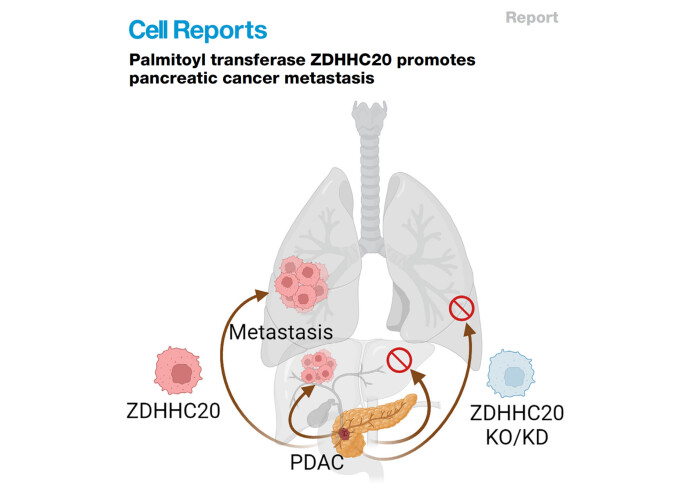ZDHHC20 promotes cancer immune evasion, a potential target in pancreatic cancer

Tate & Crick researchers have discovered that S-acyltransferase ZDHHC20 play a role in immune evasion by pancreatic cancer in a paper in Cell Reports.
Members of the Tate lab at the Francis Crick Institute, in collaboration with the group of Julian Downward, have discovered that S-acyltransferase ZDHHC20 plays a pivotal role in immune evasion by pancreatic cancer in a paper in Cell Reports, funded by Cancer Research UK.
Metastasis, the spread of cancer from its original site to other parts of the body, is a major challenge in treating pancreatic ductal adenocarcinoma (PDAC), a particularly aggressive form of pancreatic cancer which is typically detected too late for effective surgical intervention, with a 5-year survival rate of <10%. In this study, we investigated the role of a protein called ZDHHC20 in promoting metastasis in PDAC.
Using a method called in vivo short hairpin RNA (shRNA) screening, we identified ZDHHC20 as a critical requirement for the spread of PDAC to distant locations in the body, without affecting the ability of cells to multiply. Interestingly, when tested in mice lacking functional immune systems or depleted of natural killer (NK) cells, the metastasis-inhibiting effect of knocking out ZDHHC20 was significantly reduced. By employing our recently-reported chemical genetic platform to identify substrate proteins modified by ZDHHC20, we uncovered several potential targets involved in promoting metastasis and resistance to attack by NK cells, suggesting that ZDHHC20 has a role in protecting tumour cells from the body's immune defences.
Overall, this study provides valuable insights into the mechanisms underlying PDAC metastasis and identifies ZDHHC20 as a potential target for future therapeutic intervention aimed at combating this deadly disease, and potentially other hard-to-treat solid tumours.
Article supporters
Article text (excluding photos or graphics) © Imperial College London.
Photos and graphics subject to third party copyright used with permission or © Imperial College London.
Reporter
Dr Thomas J Burden
Department of Chemistry